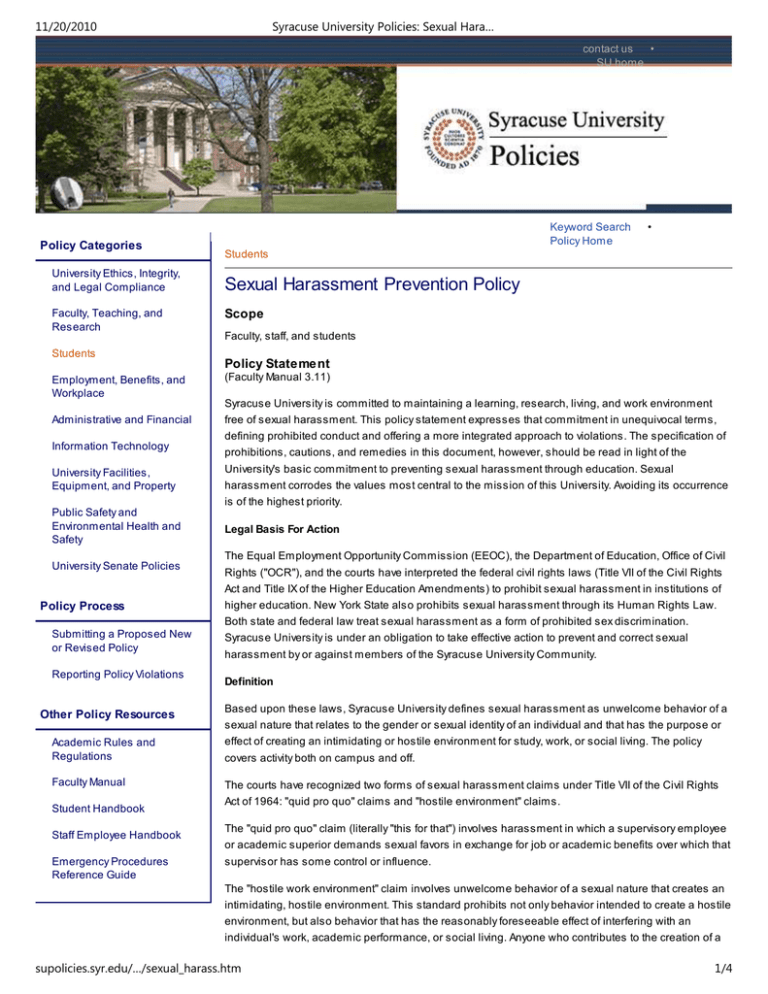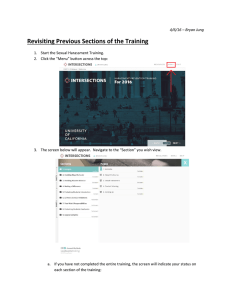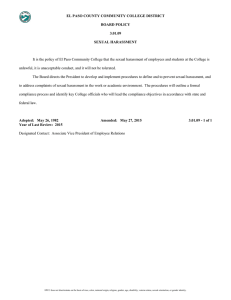
11/20/2010
Syracuse University Policies: Sexual Hara…
contact us
•
SU home
Policy Categories
University Ethics, Integrity,
and Legal Compliance
Faculty, Teaching, and
Research
Students
Keyword Search
Policy Home
•
Students
Sexual Harassment Prevention Policy
Scope
Faculty, staff, and students
Policy Statement
Employment, Benefits, and
Workplace
(Faculty Manual 3.11)
Administrative and Financial
free of sexual harassment. This policy statement expresses that commitment in unequivocal terms,
defining prohibited conduct and offering a more integrated approach to violations. The specification of
Information Technology
University Facilities,
Equipment, and Property
Public Safety and
Environmental Health and
Safety
University Senate Policies
Syracuse University is committed to maintaining a learning, research, living, and work environment
prohibitions, cautions, and remedies in this document, however, should be read in light of the
University's basic commitment to preventing sexual harassment through education. Sexual
harassment corrodes the values most central to the mission of this University. Avoiding its occurrence
is of the highest priority.
Legal Basis For Action
The Equal Employment Opportunity Commission (EEOC), the Department of Education, Office of Civil
Rights ("OCR"), and the courts have interpreted the federal civil rights laws (Title VII of the Civil Rights
Act and Title IX of the Higher Education Amendments) to prohibit sexual harassment in institutions of
Policy Process
Submitting a Proposed New
or Revised Policy
Reporting Policy Violations
Other Policy Resources
Academic Rules and
Regulations
Faculty Manual
Student Handbook
Staff Employee Handbook
Emergency Procedures
Reference Guide
higher education. New York State also prohibits sexual harassment through its Human Rights Law.
Both state and federal law treat sexual harassment as a form of prohibited sex discrimination.
Syracuse University is under an obligation to take effective action to prevent and correct sexual
harassment by or against members of the Syracuse University Community.
Definition
Based upon these laws, Syracuse University defines sexual harassment as unwelcome behavior of a
sexual nature that relates to the gender or sexual identity of an individual and that has the purpose or
effect of creating an intimidating or hostile environment for study, work, or social living. The policy
covers activity both on campus and off.
The courts have recognized two forms of sexual harassment claims under Title VII of the Civil Rights
Act of 1964: "quid pro quo" claims and "hostile environment" claims.
The "quid pro quo" claim (literally "this for that") involves harassment in which a supervisory employee
or academic superior demands sexual favors in exchange for job or academic benefits over which that
supervisor has some control or influence.
The "hostile work environment" claim involves unwelcome behavior of a sexual nature that creates an
intimidating, hostile environment. This standard prohibits not only behavior intended to create a hostile
environment, but also behavior that has the reasonably foreseeable effect of interfering with an
individual's work, academic performance, or social living. Anyone who contributes to the creation of a
supolicies.syr.edu/…/sexual_harass.htm
1/4
11/20/2010
Syracuse University Policies: Sexual Hara…
"hostile work environment" may be held liable for sexual harassment, including the employer or its
agents, if they knew of or reasonably should have known of the harassing conditions. This policy
applies to all relationships between Syracuse University faculty, staff, graduate, undergraduate
students, and administrative personnel, including student-to-student interaction. State sexual abuse
laws may also apply in cases of unwanted touching or other activity or actions.
Sexual harassment as a concept encompasses the full range of coercive, unwelcome behavior, from
subtle psychological force, to gross physical abuse. These acts may be visual (such as leering,
ogling, and physical gestures conveying a sexual meaning), verbal (e.g., sexual innuendoes,
suggestive remarks, sexually derogatory jokes), written (e-mail, cartoons or letters), or physical (such
as hugging, pinching or fondling). Sexual harassment also includes requests for sexual relations
combined with threats of adverse consequences if the man or woman refuses. What these behaviors
have in common is that they focus on men and women's sexuality and/or gender, rather than on their
contributions as students or employees in the University.
Conduct alleged to be sexual harassment will be evaluated by considering the totality of the particular
circumstances, including the nature, frequency, intensity, location, context, and duration of the
questioned behavior. Although repeated incidents generally create a stronger claim of sexual
harassment, a serious incident, even if isolated, can be sufficient. For example, a single suggestion
that academic, other educational, or employment rewards or reprisals will follow the granting or
refusal of sexual favors, may constitute sexual harassment and grounds for action under this policy.
Other Types of Harassment
There may be situations where employees or students believe that they are being subjected to a work
or educational environment that for one reason or another is hostile or inappropriate, but does not
meet the narrow definition of sexual harassment under the law and this policy. For example, students
or employees may experience harassment or a hostile environment due to race, religion, national
origin, age, disability, sex, marital status, sexual orientation, or conduct which is simply harassing or
bullying. Depending upon the circumstances, this type of conduct can be as bad or worse than a
hostile environment caused by sexual harassment. Although such conduct is not covered by the
definition of sexual harassment or this policy, it is still prohibited by other University policies and,
depending upon the conduct, may be prohibited by state and/or federal law. The University has a
number of problem referral procedures, formal and informal, which may be used to address nonsexually harassing conduct that nonetheless creates a hostile environment. Depending upon the
nature of the problem and the persons involved, these procedures include:
All members of the University community (staff, faculty, students) may bring complaints of
discrimination or harassment to:
i. someone in a supervisory capacity such as Deans, Department Chairs, Administrators,
Supervisors, etc.
ii. the Office of Human Resources, including the Office of Diversity and Resolution Process; and
iii. the Affirmative Action Grievance Committee
Additional resources and information on how to address sexual harassment may be obtained from:
i. Office of Student Affairs (students only)
ii. the Senate AFTPE Committee (faculty only); and
iii. the Office of Human Resources, including the Office of Diversity and Resolution Process
(faculty and staff).
The University is committed to insuring that its employees are permitted to work and its students are
permitted to learn in environments that are free from all types of inappropriate and harassing conduct
that have the purpose or effect of preventing those goals.
Scope of Policy
This policy applies to a broad range of behaviors by members of the University community. It covers
sexual harassment that occurs by itself or is accompanied by behavior that is otherwise
supolicies.syr.edu/…/sexual_harass.htm
2/4
11/20/2010
Syracuse University Policies: Sexual Hara…
discriminatory; it also provides an avenue of redress for those who suffer ill effects from harassment
directed at others (third-party harassment). Staff whose own performance was adversely affected by
the sexual harassment of another staff member in their work area, for example, might have a claim.
Consensual Relationships
Sexual relationships that might be acceptable in other circumstances always pose inherent risks that
they will result in sexual harassment when they occur between any teacher, supervisor, or officer of the
University and any person for whom he or she has a professional responsibility. These relationships
are fundamentally asymmetric and are known to lead to some of the worst abuses of staff, graduate
and undergraduate students. Sexual relationships that occur outside the instructional context or work
can also lead to difficulties. Administrators, supervisors, faculty members, and graduate assistants of
the University thus need to hold themselves to a high professional standard and avoid sexual
relationships with the students and subordinates with whom they work, recognizing that such
relationships pose a professional conflict of interest that may make it difficult, if not impossible to carry
out their role as educators or supervisors.
The danger that sexual harassment will occur is particularly strong in relationships between teachers
and students they are teaching. The relationship puts the student in a vulnerable position and creates
a problematic learning environment for other students who become aware of the relationship.
Professionalism within the University demands that those with authority not abuse, nor seem to
abuse, the power with which they are entrusted. This policy thus prohibits individuals employed by
Syracuse University from pursuing sexual relationships with undergraduate students they teach. This
policy strongly discourages faculty sexual relationships with graduate students as well as
relationships between a supervisor and a subordinate whose work that individual supervises. The
policy requires reporting these relationships, when they occur, to an appropriate supervisor who will
then arrange for other forms of evaluations or monitoring, where necessary. In the context of a
complaint, there will be no presumption that the relationship was welcome to the graduate student, or
staff member. Even where the faculty member in this type of relationship is not teaching, advising, or
supervising a student, the faculty member should be aware of the constant possibility that he or she
may unexpectedly be placed in a position of such responsibility and should therefore report the
relationship to their department chair.
Academic Freedom
Syracuse University strongly supports and protects the principle of academic freedom. All faculty
members of the University community have a right to use the academic forum provided by the
University to discuss controversial subjects and to express ideas with which some or most of the
members of the community strongly disagree. Sexual harassment is not about voicing unpopular
ideas. It is a form of intimidation that is unprofessional and that can silence some members of the
University community. As the American Association of University Professors states in its policy
statement on sexual harassment: "Intimidation and harassment are inconsistent with the
maintenance of academic freedom on campus. This statement is no less germane if one is being
made unwelcome because of sex, rather than unwelcome because of race, religion, politics, or
professional interests." (Academe, September-October 1990, pp. 42-43.)
Record Keeping and Confidentiality
The record-keeping procedures outlined here are designed to protect the confidentiality of individuals
to the maximum degree consistent with protection of the Syracuse University community against future
sexual harassment. The Sexual Harassment Officer will keep detailed records of complaints and
responses filed, and of dispositions of contested cases in a locked file. This material is subject to
disclosure only as required by applicable law.
Policy Against Retaliation or Reprisals
Reprisals or retaliation against persons who initiate or support action against sexual harassment are
strictly forbidden and will be grounds for severe disciplinary action. In an ongoing investigation,
evidence of reprisals or retaliation may suggest that sexual harassment has occurred. The Sexual
supolicies.syr.edu/…/sexual_harass.htm
3/4
11/20/2010
Syracuse University Policies: Sexual Hara…
Harassment Officer will advise respondents, hearing panels, and supervisory personnel about means
of preventing the occurrence of retaliation or reprisals.
Limitations on Actions
Persons who remain in the University community may invoke this grievance procedure for incidents
occurring up to two years previously. If a person severs his or her relationship with the University
(through graduation, change of job, etc.) that time frame is shortened by the requirement that such
persons initiate these procedures within six months of the date of severance or two years from the
occurrence, whichever is earlier.
While this policy applies to the University's overseas programs and to internship and fieldwork
experiences sponsored by the University, it is subject to adaptation as appropriate to these settings.
Role of the Sexual Harassment Officer
This person is responsible for educating the University community about sexual harassment,
implementing this policy, and eradicating sexual harassment. The Officer will provide assistance to
persons who believe they are victims of sexual harassment; conduct investigations and take
appropriate corrective action in order to eliminate sexual harassment; train all relevant personnel;
supervise, implement, and monitor the procedures described here; maintain accurate, secure
records. The Officer shall cooperate with the appropriate University Senate oversight committees. In all
matters concerning faculty members, the officer and the Chair of the Senate Committee on Academic
Freedom, Tenure, and Professional Ethics shall work in consultation with each other. The Officer is
appointed by and reports to the Chancellor concerning sexual harassment matters.
In addition to the procedures that follow, anyone who thinks he or she is being sexually harassed may
call the Sexual Harassment Officer to ask questions and seek clarifications and guidance (with or
without filing an actual complaint).
Policy Administration
Human Resources
Academic Affairs
Division of Student Affairs
Links to Procedures and Related Information
Faculty Manual #3.11 - same as above
Faculty Manual #3.12 - Non-Consensual Sexual Activity)
Staff Procedures
Staff Handbook (abridged version)
Student Handbook - Non-Consensual Sexual Activity
Student Handbook (abridged version as for Staff Handbook)
Date: July 2004
© 1995 - 2008 Syracuse University, Syracuse, NY 13244 • (315) 443-1870
For technical assistance contact macbeth@syr.edu
supolicies.syr.edu/…/sexual_harass.htm
4/4




